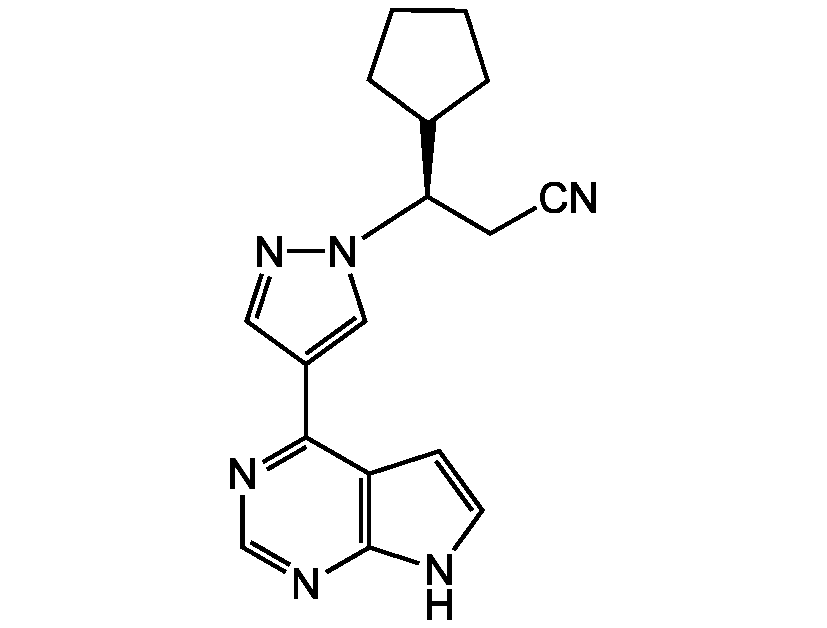Ruxolitinib
| Code | Size | Price |
|---|
| AG-CR1-3624-M005 | 5 mg | £70.00 |
Quantity:
| AG-CR1-3624-M025 | 25 mg | £150.00 |
Quantity:
| AG-CR1-3624-M100 | 100 mg | £310.00 |
Quantity:
Prices exclude any Taxes / VAT
Overview
Regulatory Status: RUO
Shipping:
-20°C
Storage:
-20°C
Images
Documents
Further Information
Alternate Names/Synonyms:
INCB018424; INC 424
Appearance:
White to off-white solid.
CAS:
941678-49-5
EClass:
32160000
Form (Short):
liquid
GHS Symbol:
GHS07,GHS08
Handling Advice:
Keep cool and dry.
Hazards:
H302, H315, H319, H361, H373
InChi:
InChI=1S/C17H18N6/c18-7-5-15(12-3-1-2-4-12)23-10-13(9-22-23)16-14-6-8-19-17(14)21-11-20-16/h6,8-12,15H,1-5H2,(H,19,20,21)/t15-/m1/s1
InChiKey:
HFNKQEVNSGCOJV-OAHLLOKOSA-N
Long Description:
Chemical. CAS: 941678-49-5. Formula: C17H18N6. MW: 306.4. Antineoplastic, anti-inflammatory and immunomodulating agent. Orally bioavailable potent ATP mimetic that inhibits both JAK1 and JAK2 with IC50 values of 2.7 and 4.5nM, respectively and is less selective for JAK3 (IC50=322nM). Affects DC differentiation and function, leading to impaired T cell activation. Used in the treatment of myeloproliferative neoplasms and psoriasis. Anticancer agent. Shown to induce apoptosis and autophagy. Potent and selective inhibitor of HIV-1 replication and virus reactivation in vitro.
MDL:
MFCD12031592
Molecular Formula:
C17H18N6
Molecular Weight:
306.4
Package Type:
Vial
Precautions:
P260, P280, P301, P312, P302, P352, P305, P351, P338, P308, P313, P405
Product Description:
Antineoplastic, anti-inflammatory and immunomodulating agent. Orally bioavailable potent ATP mimetic that inhibits both JAK1 and JAK2 with IC50 values of 2.7 and 4.5nM, respectively and is less selective for JAK3 (IC50=322nM). Affects DC differentiation and function, leading to impaired T cell activation. Used in the treatment of myeloproliferative neoplasms and psoriasis. Anticancer agent. Shown to induce apoptosis and autophagy. Potent and selective inhibitor of HIV-1 replication and virus reactivation in vitro. It is investigated against the spread of the SARS-CoV-2 (COVID-19).
Purity:
>98% (HPLC)
Signal word:
Warning
SMILES:
N#CC[C@H](C1CCCC1)N1C=C(C=N1)C1=NC=NC2=C1C=CN2
Solubility Chemicals:
Soluble in DMSO or ethanol. Insoluble in water.
Transportation:
Non-hazardous
UNSPSC Category:
Biochemical Reagents
UNSPSC Number:
12352200
Use & Stability:
Stable for at least 2 years after receipt when stored at -20°C.
References
Enantioselective synthesis of Janus kinase inhibitor INCB018424 via an organocatalytic aza-Michael reaction: Q. Lin, et al.; Org. Lett. 11, 1999 (2009) | Preclinical characterization of the selective JAK1/2 inhibitor INCB018424: therapeutic implications for the treatment of myeloproliferative neoplasms: A. Quintas-Cardama, et al.; Blood 115, 3109 (2010) | Selective inhibition of JAK1 and JAK2 is efficacious in rodent models of arthritis: preclinical characterization of INCB028050: J.S. Fridman, et al.; J. Immunol. 184, 5298 (2010) | Ruxolitinib, a selective JAK1 and JAK2 inhibitor for the treatment of myeloproliferative neoplasms and psoriasis: R.A. Mesa; IDrugs 13, 394 (2010) | The JAK-inhibitor ruxolitinib impairs dendritic cell function in vitro and in vivo: A. Heine, et al.; Blood 122, 1192 (2013) | Specificity and mechanism-of-action of the JAK2 tyrosine kinase inhibitors ruxolitinib and SAR302503 (TG101348): T. Zhou, et al.; Leukemia 28, 404 (2014) | Tumoricidal effects of the JAK inhibitor Ruxolitinib (INC424) on hepatocellular carcinoma in vitro: G.S. Wilson, et al.; Cancer Lett. 341, 224 (2013) | INCB018424 induces apoptotic cell death through the suppression of pJAK1 in human colon cancer cells: H.J. An, et al.; Neoplasma 61, 56 (2014) | Ruxolitinib is a potent immunosuppressive compound: is it time for anti-infective prophylaxis? A. Heine, et al.; Blood 122, 3843 (2013) | Ruxolitinib and tofacitinib are potent and selective inhibitors of HIV-1 replication and virus reactivation in vitro: C. Gavegnano, et al.; Antimicrob. Agents Chemother. 58, 1977 (2014) | Ruxolitinib induces autophagy in chronic myeloid leukemia cells: B.G. Bagca, et al.; Tumour Biol. 37, 1573 (2016)



